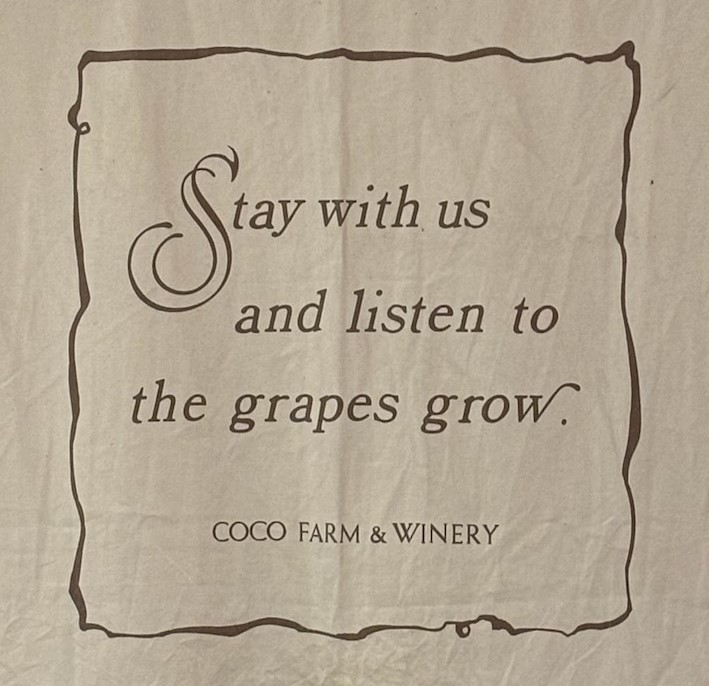
Recently, I had the opportunity to visit Coco Farm and Winery in Ashikaga, Japan, a winery with a special history and partnership with our own.
Coco Farm and Winery is an incredibly unique winery. Founded in 1958 as a vineyard by Noboru Kawada, a local junior high teacher, the business would quickly evolve and redefine itself. Hoping to support his community and develop the organization into something more, it would develop into a school and home for people with intellectual disabilities to come live, pursue an education, and work together to tend the vines. In 1984, the farm would make its first wine and become a pioneer in the Japanese industry. The philosophy of Coco Farm and Winery is low intervention and respecting the earth, growing organically throughout their vineyard and allowing for native yeast fermentation in the winery. Today, both aspects are alive with a core tenet being respect to its students, viewing each individual as an equal and empowering them to be decision makers in the vineyard and the winery.
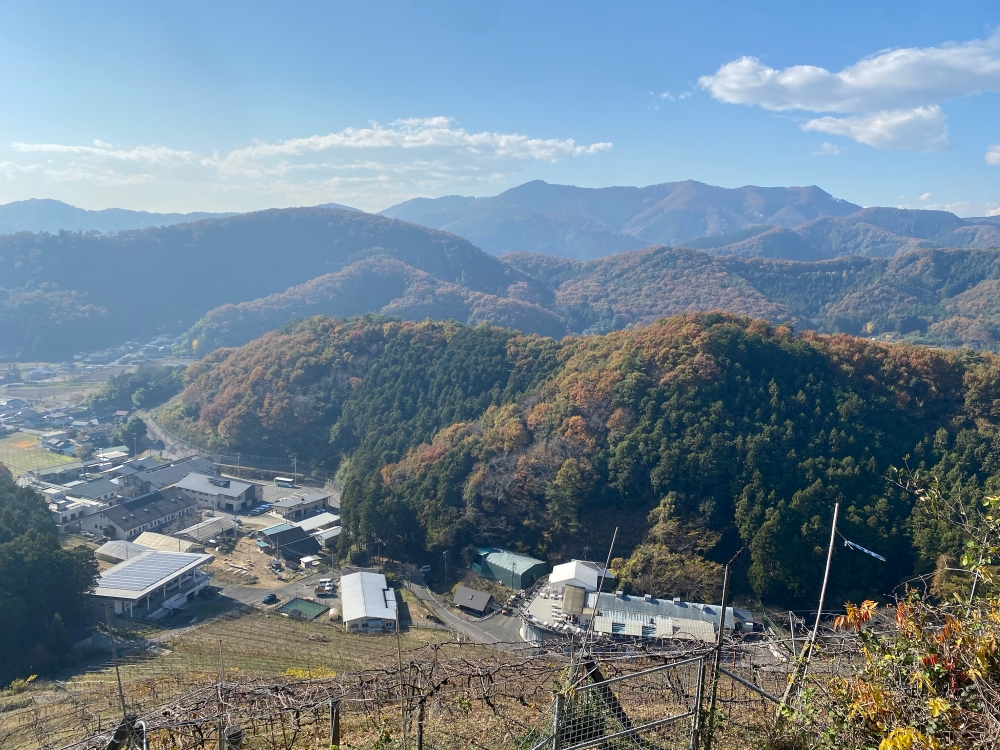 The View From The Top of The Coco Farm Vineyard
The View From The Top of The Coco Farm Vineyard
Due to Japan’s unique growing conditions and environment, some traditional Vitis vinifera varieties struggle to thrive, therefore the winery considered alternative varieties that could handle the often wet growing season, the temperate climate, and disease pressure that comes along with these conditions. Looking internationally, they found that Missouri’s Weinstrasse has a remarkably similar climate to Ashikaga, Japan, and had developed a wine region based on heritage grapes native to its region. Bruce Gutlove, then a wine consultant at Coco Farm and Winery and originally a native of California, knew of the prominence of the Norton grape in Missouri and had been impressed by Stone Hill Winery Norton wine. In 2000, a delegation including Bruce and Machiko Ochi, the 2nd generation director of Coco Farm and Winery, visited Stone Hill Winery to learn about the Norton grape, wine, and vineyards firsthand. After tasting the wine for herself, Machiko knew she needed to grow the grape in Ashikaga.
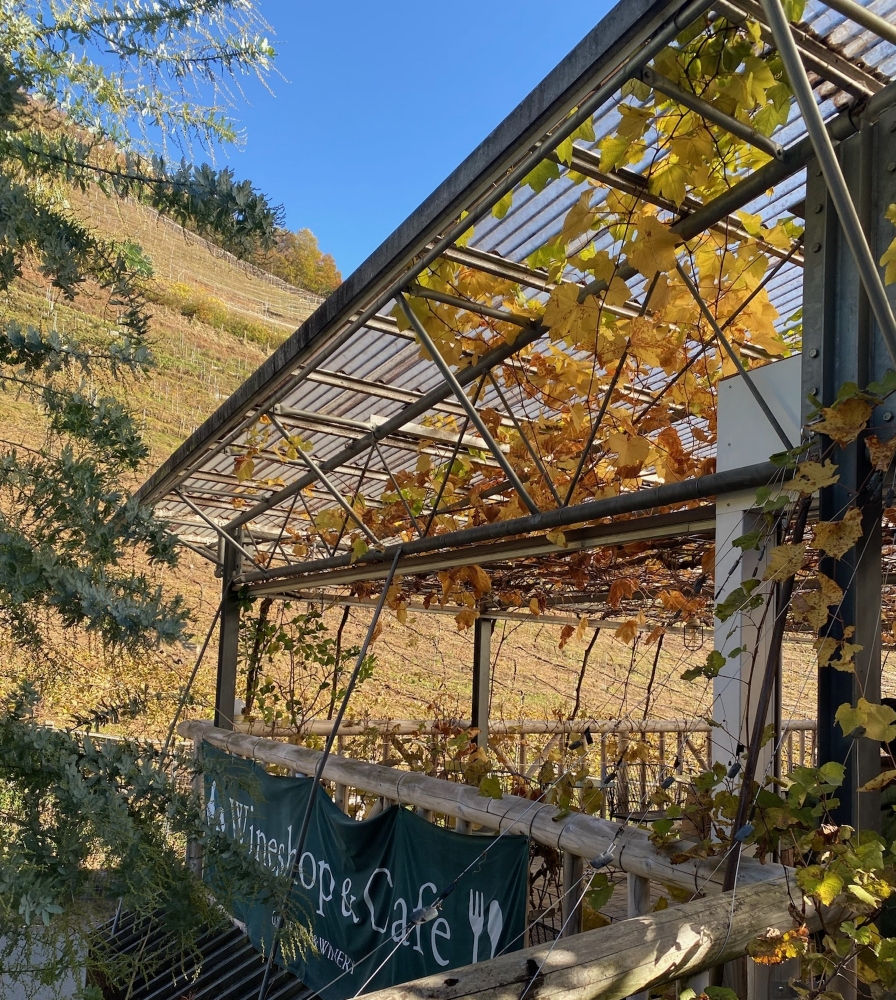 The First Vine Seen – A Norton Growing Over the Patio!
The First Vine Seen – A Norton Growing Over the Patio!
Working with my dad Jon, Coco Farm and Winery took cuttings from our vineyard through the USDA and UC Davis system to export them through the appropriate protocols including receiving phytosanitary certification, thus ensuring the live plant material was free of pests and diseases. Once they arrived in Japan, they were quickly planted and Norton grapevines officially took root on a new continent.
This November, I travelled to Ashikaga and had the opportunity to visit the beautiful Coco Farm and Winery. Machiko Ochi is an incredibly charming, generous, and hospitable woman and served as our host while we explored the farm, vineyards, and winery. Accompanying her were Hideki Ishii, head viticulturist, and Toyoichiro Shibata, head enologist.
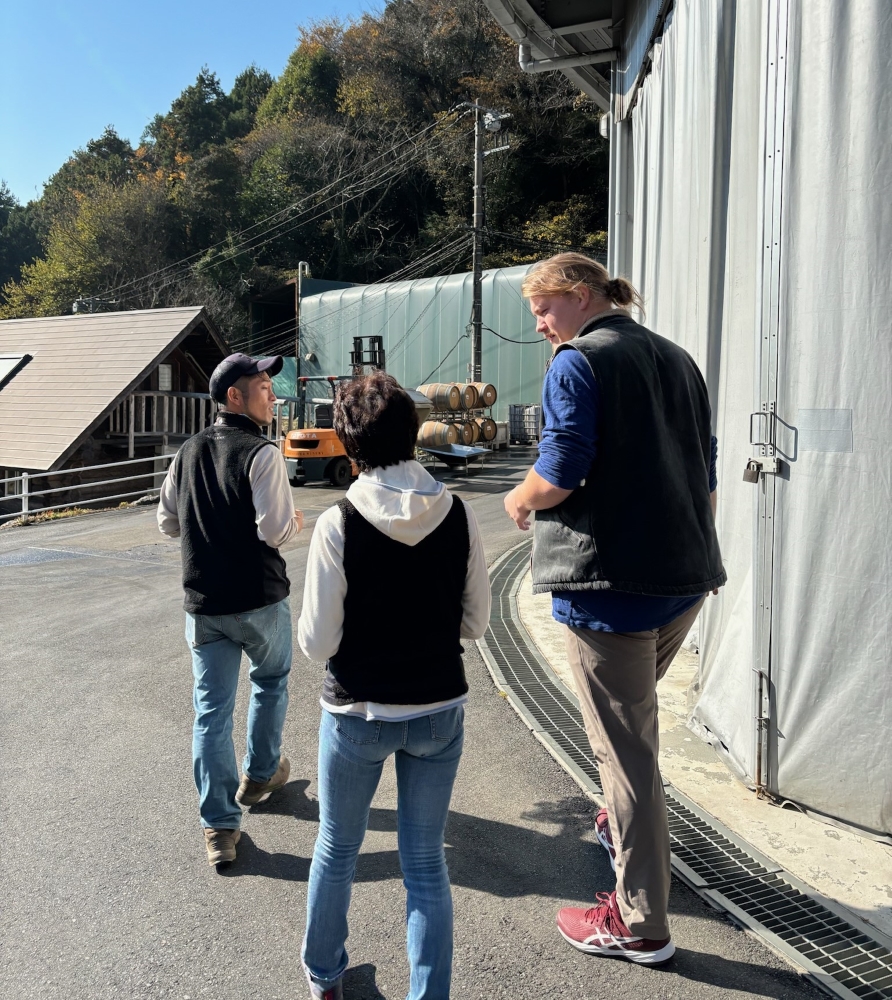 Nathan, Machiko, and Hideki Touring the Grounds
Nathan, Machiko, and Hideki Touring the Grounds
There was an exciting energy surrounding the meeting. Machiko clearly had fond memories from her travel to Missouri and Stone Hill all those years ago, and it seemed that she was honored to host someone from the winery which helped her bring Norton to Japan. This eagerness made our first stop clear, a beeline to the work-in-progress Norton which was harvested a month prior. Toyoichiro shared the wine liberally, thrilled to discuss the grape and its unique aspects with someone equally familiar with it.
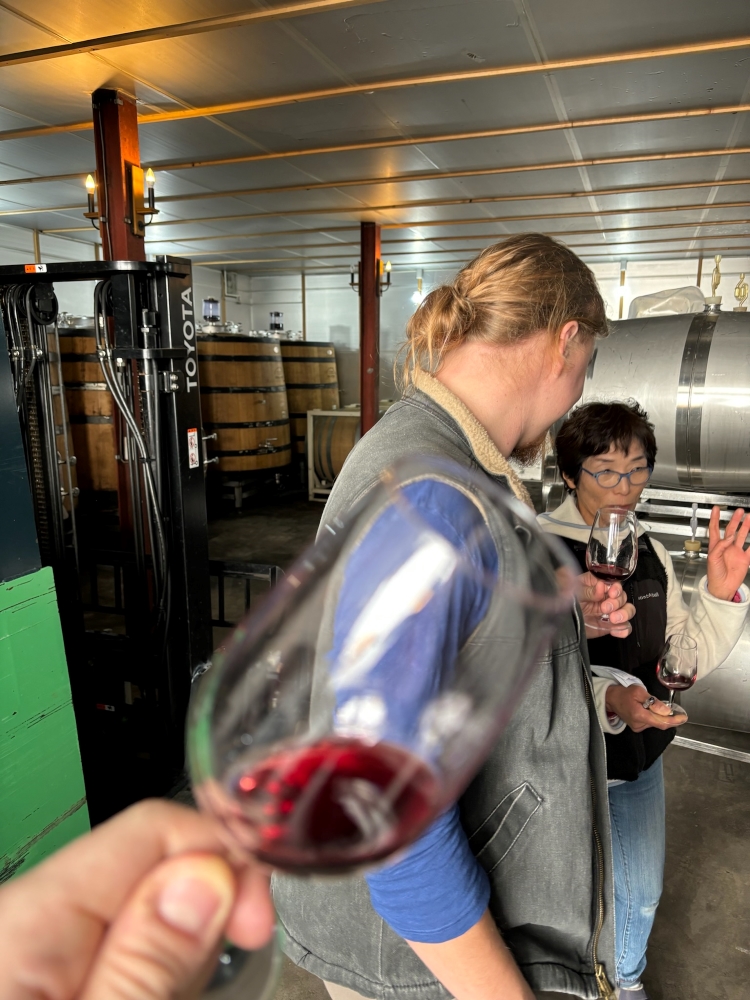 Trying This Year’s Work-in-Progress Norton Wine With Machiko
Trying This Year’s Work-in-Progress Norton Wine With Machiko
The 2023 Norton wine was done in a light style, having less of the color and tannic expression that is characteristic in Missouri Norton wines. However, it continued to have the delicious bramblefruit and black currant flavors as well as the subtle herbal cooking spice touch. The winery was proud of their Norton, both having the grapevines and the wine. Due to their success since starting with the grape in 2000, other Japanese wineries throughout the region had also started growing Norton vines and producing wines with it. As we explored deeper into their cellar and winery, a staffer had apparently heard of my visit and rushed to find me. Extending out his phone with a photo visible, I immediately recognized what was on the screen. It was the Stone Hill cellars. He had visited in 2017 and brought Coco Norton wine with him, which I opened with my family in 2019 (and was the reason I became familiar with this unique partnership!). He too was thrilled to reminisce about his visit to Missouri and share Coco Farm with me.
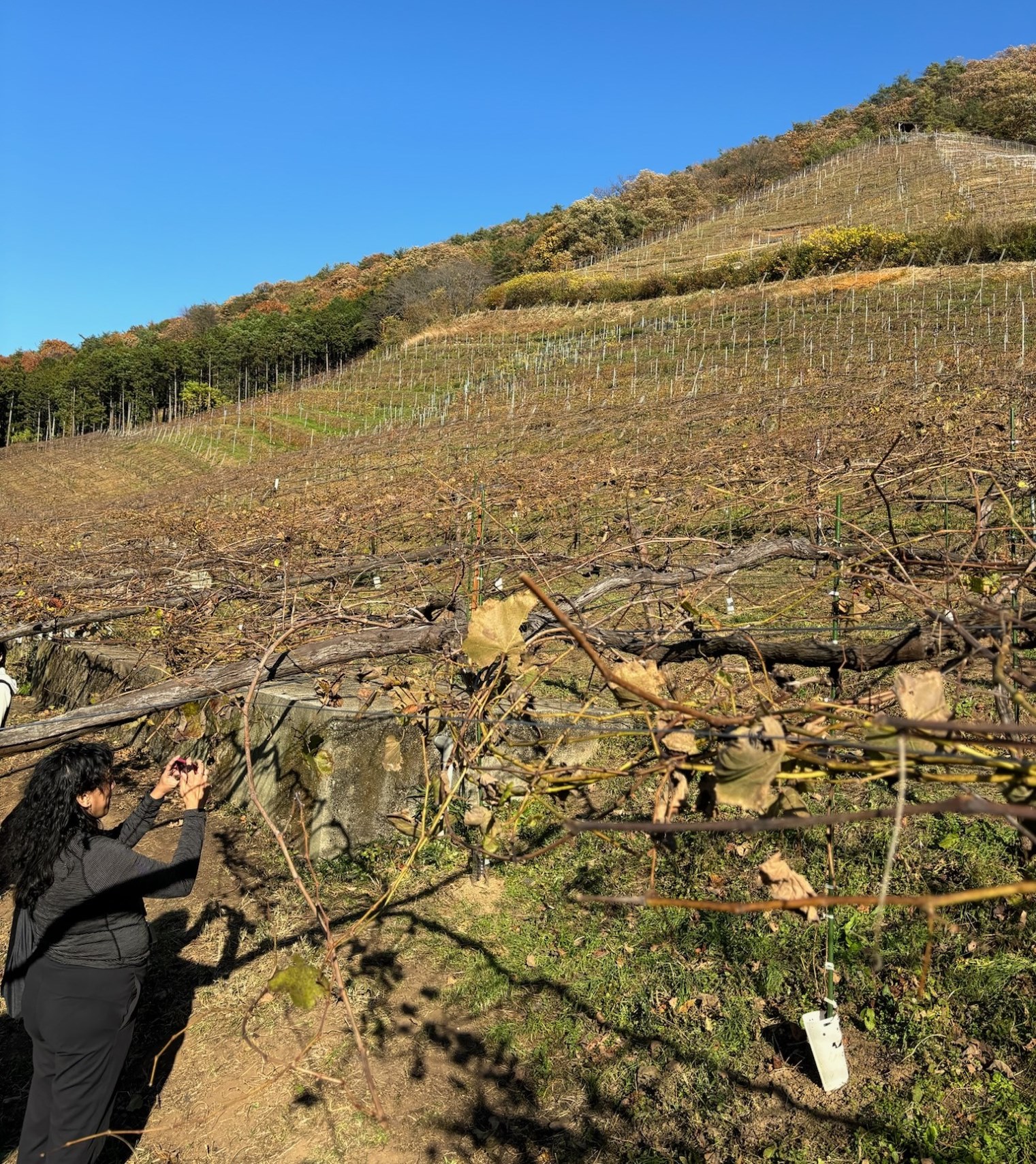 Coco Farm Vineyard With Vineyard Slopes of 42°
Coco Farm Vineyard With Vineyard Slopes of 42°
As our tour progressed, we took a stroll through the vineyard and inspected the vines. Management in the vineyard was done organically, aiming to keep the soil and fruit microbiome as in tune with nature as possible. The winery grows a few different types of grapes, from American heritage grapes like Norton, to modern hybrids such as Traminette and Chardonel, to Vitis vinifera grapes such as Tannat, as well as a category unique to Japan, Japanese bred hybrid grapes. Some of which, like Muscat Bailey A, are derived from American heritage grapes bred by T.V. Munson, and others such as Koshu which have part of their lineage tracing to Japanese native grapes, either intentionally or unintentionally. The Norton grapevines were grown in a pergola system, allowing staffers to work underneath the vine and giving lots of sun exposure to each vine. Farming about 14 acres of vines across three sites near the winery, the adjacent hillside was an impressive site, not just for its surroundings but due to its intense slope, maxing out at 42°.
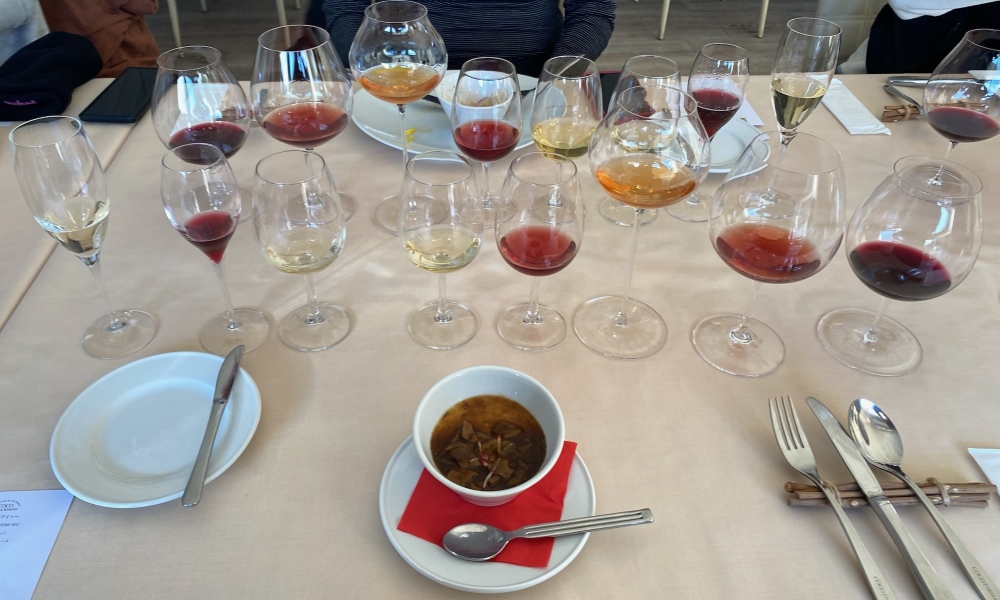 Tasting the Wines at Lunch
Tasting the Wines at Lunch
After our tour of the grounds and vineyards, we enjoyed an incredible tasting of their wines and a delicious lunch. The tasting showcased the breadth of their styles and grapes and included demi-sec Méthode Champenoise sparkling wine, Pétillant-Naturel wine, traditional red and white varietals and blends, and fermented-on-the-skins orange wines. The wines featured grapes native to Japan, American heritage grapes, as well as Vitis vinifera grapes, all respected equally and given their time in the spotlight. There was no grape prejudice to be found. A standout was an off-dry Traminette-Vignoles white wine blend.
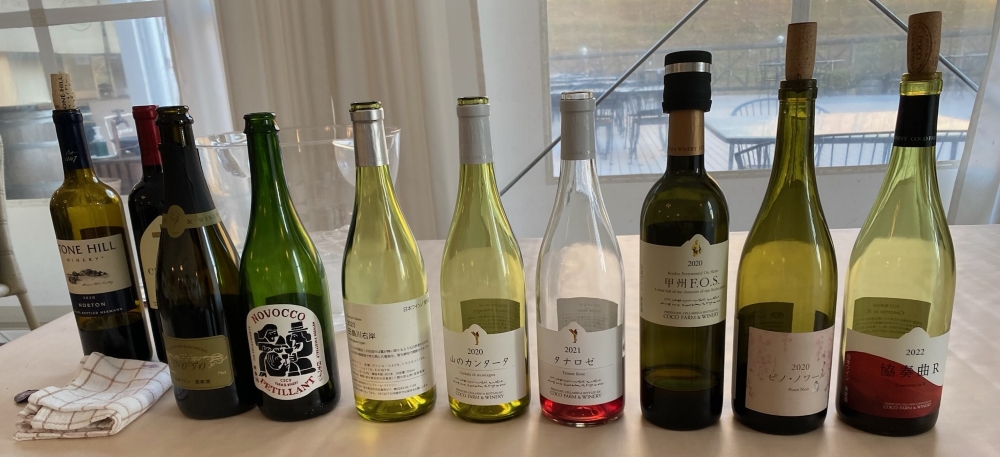
The Tasting Lineup Including Our 2019 Norton and Cross J Norton
To finish the tasting, I presented two Norton wines I was able to bring with me for the trip, our 2019 Norton and 2020 Cross J Norton. Presenting them to Machiko, I told her they were for her, but she was eager to open one up to enjoy with the tasting. So, the 2019 Norton’s cork came out and wine was poured. As she tasted the wine, one could see that Machiko was reliving fond memories from years ago when the Coco Farms project was still in its youth, trying to find the grapes that could help forge its future. Turning to me, she was filled with the emotion only a great wine can achieve, “I remembered it being incredible. It is even better than I remember. This is why we needed to grow this grape. I knew that the first time I tried it, and this proves it again.”
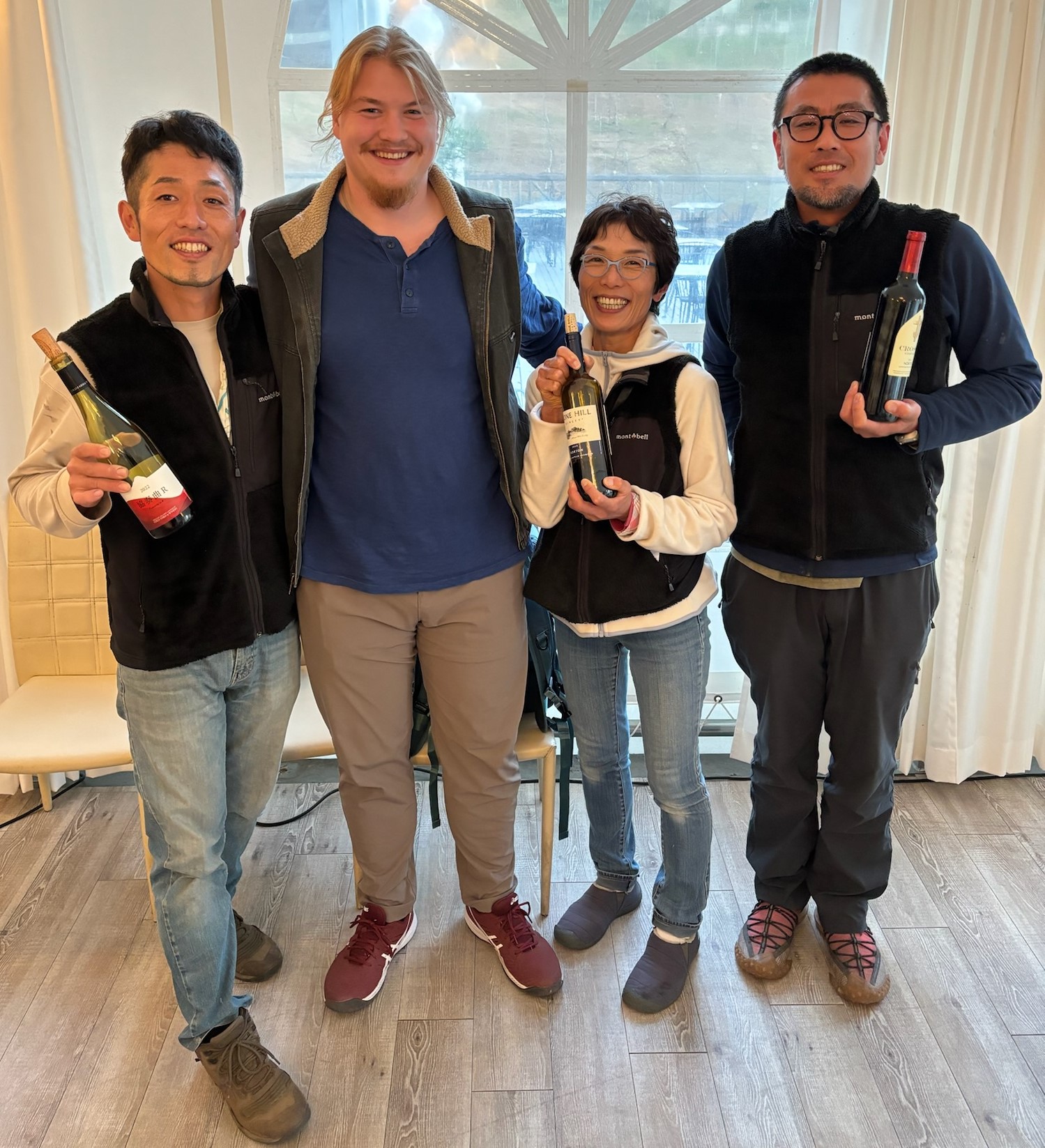 Nathan, Machiko, Hideki, and Toyoichiro Show Off Their Norton Wines
Nathan, Machiko, Hideki, and Toyoichiro Show Off Their Norton Wines
Japan is a land of beauty and its people are potentially the world’s most generous and sincere hosts. If you ever find yourself in Japan, the wine industry is well worth exploring. They are innovators and pioneers with grape variety experimentation, blending all the world’s grapes into great wine. I hope America can take the cue from Japan to be proud of great wine, regardless of its heritage.
Written by Nathan Held